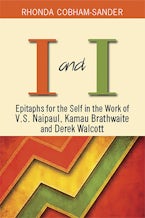When V.S. Naipaul, Kamau Brathwaite and Derek Walcott published their first literary efforts there was no such thing as a Caribbean literary tradition. By the end of the twentieth century their work had begun to set the standard for literary production across the English-speaking world and they knew it would outlive them. The epitaphs for themselves and others written into their later works are meant to pre-empt their judgement by others, to tutor us in the proper ways of reading their achievements and to insert into the literary tradition, against the odds, a record of their subjectivity. This endless tautological conversation of I with I conceals a drift towards aesthetic stagnation but it has allowed all three authors the licence to experiment with new forms and to face up to issues that in their earlier work they were too insecure or too inexperienced to confront.
The elegant close readings Rhonda Cobham-Sander offers here from Naipaul’s A Way in the World, Brathwaite’s Barabajan Poems and Walcott’s Omeros demonstrate how the project of writing one’s critical epitaph becomes an overriding thematic concern as well as an important source of stylistic innovation in the work of all three writers. From personal testimony, to analytic insight, to theoretical interventions, her essays explore and celebrate the unique relationship the three writers forged with each other and with their Caribbean readers over the course of their careers.

